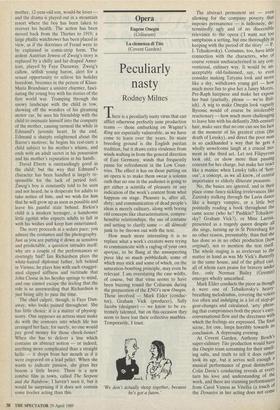Cinema
The Burning Secret (PG', Cannon Shaftesbury Avenue)
Secret silliness
Hilary Mantel
Stefan Zweig, who died in 1942 and was extremely famous in his day, is now as unread as if he had been dead for centur- ies. His psychological studies of historical figures do not suit the intellectual fashion, and his particular strain of idealism seems to have vanished from Europe. But his fiction has been taken up by film critics during the last fortnight, and as an instant expert I am able to report that the short story on which Andrew Birkin's film is based is a plodding affair, in which Zweig examines at gloomy and scrupulous length the awakening sexual feelings of a con- fused adolescent. Modern writers would dispose of the subject more subtly and at half the length, and so, with no pressing need to be reverent about the text, you look to the cinema for an imaginative and lively reworking.
We have a fraught love-hate triangle:
mother, 12-year-old son, would-be lover— and the drama is played out in a mountain resort where the boy has been taken to recover his health. The action has been moved back from the Thirties to 1919; a large phallic watchtower has been placed in view, as if the doctrines of Freud were to be explained in comic-strip form. The ardent Austrian Jewess of Zweig's story is replaced by a chilly and fur-draped Amer- ican, played by Faye Dunaway. Zweig's callow, selfish young baron, alert for a sexual opportunity to relieve his holiday boredom, becomes in the person of Klaus- Maria Brandauer a sinister charmer, fasci- nating the young boy with his stories of the first world war. Tramping through the snowy landscape with the child in tow, showing off the wonders of his gleaming motor car, he uses his friendship with the child to insinuate himself into the company of the mother, causing turmoil the while in Edmund's juvenile heart. In the end, Edmund is sharply enlightened about the Baron's motives; he begins his rest-cure a child subject to his mother's whims, and ends with an adult secret in his possession and his mother's reputation in his hands.
David Eberts is outstandingly good as the child; but the way that Edmund's character has been handled is largely re- sponsible for the lack of period feel. Zweig's boy is constantly told to be seen and not heard; he is desperate for adults to take notice of him, and we wish for him that he will grow up as soon as possible and leave his painful state behind. Birkin's child is a modern teenager, a handsome little egotist who expects adults to fall in with his wishes and keep him entertained.
The story proceeds at a sedate pace; you admire the costumes and the photography. Just as you are putting it down as sensitive and predictable, a question intrudes itself: why are a couple of the performances so rivetingly bad? Ian Richardson plays the white-haired diplomat father, left behind in Vienna; he plays him with such exagger- ated clipped stiffness and rectitude that John Cleese in his heyday springs to mind, and one cannot escape the feeling that the role is so unrewarding that Richardson is just being silly to pass the time.
The chief culprit, though, is Faye Dun- away, who looks pained throughout. She has little choice: it is a matter of physiog- nomy. One supposes an actress must make do with the contours into which life has arranged her face; for surely, no one would pay good money for those cheek-bones? When she has to deliver a line which contains an abstract notion — or indeed, anything more complicated than a straight hello — it drops from her mouth as if it were engraved on a lead pellet. When she wants to indicate passion, she gives her bosom a little heave. There is a new zombie film in town, called The Serpent and the Rainbow; I haven't seen it, but it would be surprising if it does not contain some livelier acting than this.



















































 Previous page
Previous page